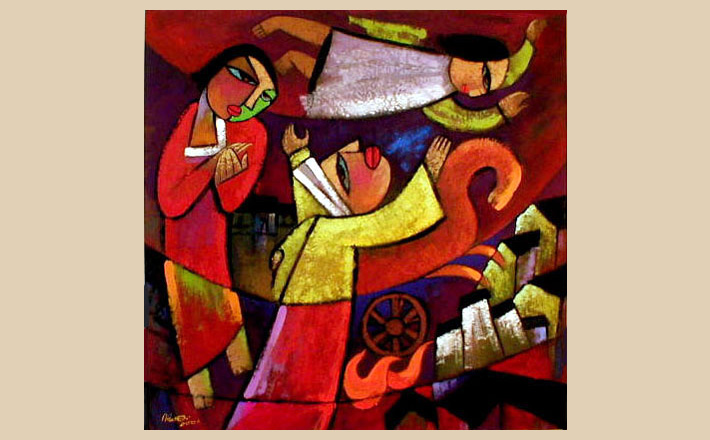Commentary on Psalm 16
Life comes with the blessing of choices, although some philosophers have endeavored to make us think of them as a curse.
Our psalm selection reports the blissful choice that the psalmist made to recognize God as the Lord, without whom there is nothing good or lasting. It echoes the first lesson from 1 Kings 19, in which Elisha chooses to follow Elijah in the walk of God’s prophet. The epistle lesson from Galatians 5 celebrates the freedom Christ made possible so that we may bear the manifold fruit of the Spirit in life. The gospel lesson from Luke 9 completes the picture of a servant of the Lord, who takes the path of service single-heartedly and with trust.
The psalmist, who will turn to none but God, presents his petition for protection (literally “keep me,” verse 1). In the Hebrew Bible, the word “keep” (shamar) almost always comes with God as the subject when the object of the verb is a human being (for example, Psalm 121:4; 145:20). Counting on that which God is well known for doing, the psalmist asks God to shield him.
The psalmist’s prayer is followed by a declaration of trust with a language that recalls the rite of covenant-making or renewal (Psalm 16:2). The first part of the statement (“You are my Lord”) sets the parameters of the pact. As a term of the covenant, the psalmist says that he cannot conceptualize what is good apart from God. He has nowhere else to turn in times of need. God’s deliverance, for which he petitioned in verse 1, is no longer something merely desired; it is an absolute necessity.
Whereas the New Revised Standard Version presents the psalmist making the vow of fidelity concurrently with his petition, the Hebrew text offers an alternative way to imagine the scene, in that verse 2 can be translated, “I said [or, I have said] to the LORD.” In other words, the psalmist has trusted in God in the past and in a consistent manner.
His adoration of God has an implication for the way he deals with others, whom he introduces as “holy ones” (verse 3). The “holy ones” may elsewhere refer to angels or other divine beings, but in verse 3, they are “in the land,” which makes it clear that he refers to the community of the faithful people. He accords paramount value to “the holy ones in the land,” whom he calls “noble” (verse 3). Their lofty status, however, is not predicated on their pedigree or power. Their worthiness lies solely in their dedication to God, and their commitment constitutes the basis of the psalmist’s utmost joy. He would place them in sharp contrast to those who are eager to “choose another god” (verse 4)—those who are caricatured in the King James Version as hastening in their folly of unfaithfulness.
They not only bring pain upon themselves but also cause harm to others, as implied in the image of their “drink offerings of blood” (verse 4a). The ghastly image hints at the facade of worship that conceals the violent acts they are engaged in behind a pretense of piety. The psalmist unequivocally refuses to join their false worship. In contrast to them, the psalmist would expound the blessing he recognizes in sticking with God. He adds that he would not “take their names upon my lips” (verse 4b). While the sentence can refer to a number of contexts, the psalmist clearly declines to keep them company. The New Revised Standard Version’s translation in verses 4–5 is clever, juxtaposing those who “choose” another god and the psalmist who has “chosen” the Lord. Although the latter case involves a different Hebrew word, the New Revised Standard Version renders a picture of God as the choice portion of inheritance.
The idea of inheritance is paired with the portrayal of God who maintains the psalmist’s “lot,” which may refer to his physical property or to his destiny (verse 5). While the basic tenor is clear, curiously the two halves of the verse display different sentence structures. The first half reports the psalmist’s declaration in the third person (“The LORD is my chosen portion”). By contrast, in the second half of the verse, the psalmist switches to the second person: “You hold my lot.” The shift simulates a scene in which, upon making a public statement concerning God’s sovereign care, the psalmist turns to address God directly with his confession of faith.
We continue to receive his personalized reflection on God in verse 6. He regards the Lord as his inheritance that was handed down to him; in turn, he will hand down his faith to later generations. He describes what he has received as something that has “fallen” to him, acknowledging that it came to him as a gift of grace that he can neither claim credit for nor take for granted. The word “heritage” presupposes changing generations, and the word “fallen” may, albeit obliquely, refer to dying, but death will not end the legacy of his faithfulness.
“The boundary lines” (verse 6) may also be a metaphor for God’s way that guides his path in life—the kind of counsel that he talks about in verse 7, and the teaching of the Lord that keeps him up in the night (see also Psalm 119:55, 148). Alternatively, the psalmist of Psalm 16 may refer to the dark moments in life. Even then he is not left without confidence. In a steadfast manner he is led by the Lord instead of being like one “who puts a hand to the plow and looks back” (Luke 9:62a). Jesus says such a person is not fit for the reign of God (verse 62b).
The psalmist will stay with the Lord instead of being moved (literally “will not totter”; Psalm 16:8b). He is confident that this is the formula for security as well as for happiness (verse 9). This verse contains a catalogue of organs that often symbolize the center or entirety of one’s being, constructing a picture of exuberance that permeates his body and soul.
The psalmist trusts that God will deliver him from death (verse 10). He anticipates that God will show him “the path of life” (verse 11). No wonder Peter on the day of Pentecost finds this psalm pertinent when he is compelled to present to the crowd his testimony to the resurrection of Jesus Christ (Acts 2:27). God ensures the life of the faithful consistently from the Old to the New.


June 26, 2016